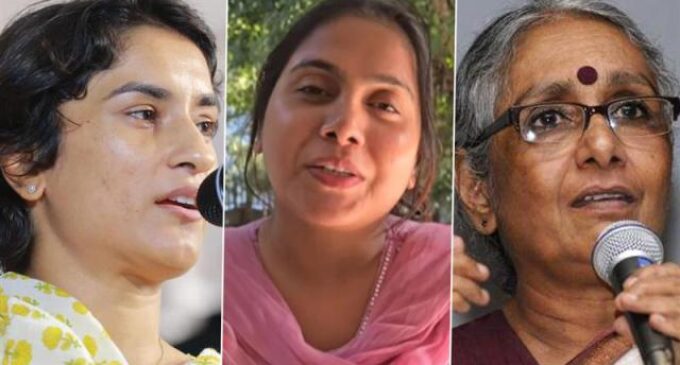Aruna Roy, Vinesh Phogat, and Pooja Sharma among BBC’s 100 most inspiring women of 2024

NEW DELHI,DEC 4 : Three prominent Indians—social activist Aruna Roy, wrestler-turned-politician Vinesh Phogat, and funerary rites pioneer Pooja Sharma—have made it to the prestigious BBC list of 100 Most Influential and Inspiring Women for 2024. Their inclusion in the list highlights their remarkable contributions across various fields.
Aruna Roy has long been a trailblazer in social justice and rural development, with her impactful advocacy for transparency and accountability in government processes. Vinesh Phogat, a former wrestler who has transitioned into politics, has been a vocal advocate for women’s rights and has also fought for better policies in sports. Pooja Sharma, who has pioneered a new approach to funerary rites, has been redefining societal norms and practices surrounding death and mourning.
These women join an illustrious group that includes international figures like astronaut Sunita Williams, Hollywood star Sharon Stone, Nobel Peace laureate Nadia Murad, and climate activist Adenike Oladosu, further solidifying the global recognition of women breaking barriers across different spheres.
Aruna Roy is one of India’s most influential social activists and a key figure in the Right to Information (RTI) movement, Roy is a former Indian Administrative Service (IAS) officer who turned into a full-time social activist. After quitting her prestigious government job, Roy dedicated nearly four decades to working with rural communities across India, advocating for transparency and the rights of the marginalized.
Roy co-founded the Mazdoor Kisan Shakti Sangathan (MKSS), a grassroots organization focused on demanding transparency in government dealings and ensuring fair wages for labourers. Her efforts played a pivotal role in the creation of the Right to Information Act, passed in 2005, which empowered Indian citizens to seek accountability from the government.
Throughout her career, Roy has been at the forefront of numerous protests and campaigns, fighting for the rights of the poor and oppressed. Her leadership in these causes has earned her several prestigious awards, including the Ramon Magsaysay Award, often referred to as the “Nobel Prize of Asia.”
In addition to her activism, Roy serves as the president of the National Federation of Indian Women, and her memoir, The Personal Is Political, delves into her personal and professional journey, offering an insightful look at the challenges and triumphs she faced over the years.
Aruna Roy’s The Personal is Political: An Activist’s Memoir is a testament to an extraordinary life devoted to bringing changes in an unequal society
Vinesh Phogat, a three-time Olympian and one of India’s most decorated wrestlers, is known not only for her sporting achievements but also for her outspoken stance against gender bias in sports. She has clinched medals at the World Championships, Commonwealth Games, and Asian Games.
In 2024, Phogat made history as India’s first female wrestler to reach an Olympic final. However, her dreams were dashed when she was disqualified due to failing the weigh-in. Subsequently, Phogat announced her retirement from wrestling and transitioned into politics.
A prominent advocate for women’s rights, Phogat became the face of a significant protest by Indian wrestlers against the chief of the Indian Wrestling Federation, Brij Bhushan Sharan Singh, who was accused of sexually harassing female athletes—charges he denied. The protest drew national attention, especially when police detained Phogat and other wrestlers during a demonstration
Pooja Sharma, who has earned recognition on the BBC’s 100 Most Influential and Inspiring Women of 2024 list, has made a profound impact by performing last rites for unclaimed bodies in Delhi over the past three years. Her journey began with personal tragedy when she was forced to perform the final rites for her brother, who was brutally murdered in front of her in 2022, and no one came forward to assist with his funeral. This experience ignited her mission to help those who die alone, offering them dignity in death.
Sharma faced significant resistance from her community and religious authorities, as traditionally, funerary rites in Hinduism are reserved for men. Despite this, she has performed last rites for over 4,000 people from various religious backgrounds, highlighting the need for dignity in death for all. Her work has earned her widespread recognition, including over 350,000 followers on social media, where she shares her mission.
In addition to her funerary work, Pooja Sharma founded the Bright The Soul Foundation, an NGO dedicated to the welfare of marginalized communities. The foundation focuses on environmental welfare, elderly care, child education, and providing essential items to those in need. Her work has not only transformed lives but has also brought attention to the challenges and resilience of women in the face of adversity.
-PTI






